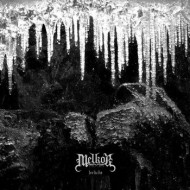 Melkor has been for the most part a single man black metal project since its inception in 2004. This can mean a high degree of introspection and anger. There is some but what is remarkable about “Irrlicht”, Melkor’s second album, is the way in which it expands into atmospheres and images. It’s in fact a clever title as although “Irrlicht” can be translated as “will o’ the wisp”, this doesn’t do it justice as “irren” sends out images of flickering, wandering and even insanity.
Melkor has been for the most part a single man black metal project since its inception in 2004. This can mean a high degree of introspection and anger. There is some but what is remarkable about “Irrlicht”, Melkor’s second album, is the way in which it expands into atmospheres and images. It’s in fact a clever title as although “Irrlicht” can be translated as “will o’ the wisp”, this doesn’t do it justice as “irren” sends out images of flickering, wandering and even insanity.
I was immediately struck by the power as a steady controlled wave of ferocious black metal runs through “Spiegelwand” (Mirror on the Wall). The patterns are of course dark but melodic too as an imposing scene is set. Stylistically, there’s an air of Katatonia in the haughty guitar work. The progression has a feel of Opeth too, but remember this is predominantly about a struggle, a heart which stops beating and blood dripping onto the mirror. While I’m indulging in comparisons, the monstrous “Irrlicht (Ferne II)” has a strong similarity to Dark Fortress as it heavily creeps its way though cobwebs, picking up the pace in deadly fashion. The croaked vocals in Melkor’s native German language are just the job for this outpouring of controlled fury. A melancholic acoustic and symphonic passage enters the scene and adds hitherto unfelt delicacy. The structures are clean, but with them go shadows, and what attracts me to the first three tracks of this album is the contrasting nature of these shadows. They can be grey, harsh, suggestively melancholic and there is occasional light but it’s all couched in a comforting constancy. “Irrlicht (Ferne II)” has great majesty yet we are also swept along by threats. The contrast can be felt in the previous track “Die Welle Erneuert Sich” (The Wave is Renewed). It’s not all black. We are invited to visualise a land without protection, an image like a dazzling dream, sunshine and fertile ground. The music is similarly expressive.
Imaginative patterns disappear progressively as a constant an even dour form of black metal kicks in. “Pangaea” has intensity but it’s bleak. “In Den Welkenden Wäldern” (In the Fading Forests) is fiery but complicated. The riff represents greyness. There’s an acoustic section. I didn’t get the flow or idea behind this one but the rasping vocals and bleak and heavy instrumentals, tinged with symphony, give it a black identity. “Dese Berges Schweigen” (Silence of the Mountain) is yet more punishing and downtrodden. It comes from the furnace but didn’t set me on fire. I was pleased when “Opferlamm” (Sacrificial Lamb) takes us back to a layered and more imaginative pattern as a sophisticated and melancholic riff guides us through the constantly eternal darkness. The vocalist’s growls are creepy. “The Great Defender” brings the album to a close but although it’s ringing and imperious in its black metal output, and there is heightened tension, I felt that the earlier majesty had been lost as it crashes remorselessly through clouds of blackness.
After a very promising start, I felt that “Irrlicht” didn’t entirely live up to its name and seemed to sacrifice imaginative ideas and creativity for harshness and complexity. Harshness needs impact and I didn’t always sense it. Yet Melkor also proves that when he builds up atmospheres, he can do it coherently, very impressively and very powerfully.
(7/10 Andrew Doherty)

Leave a Reply